A denial can be devastating, but it is the first step to addressing it.
When USCIS or another immigration agency denies your application, they typically send a Notice of Decision. This document explains the reason for the denial and outlines whether you have the right to appeal, file a motion, or take other legal steps.
Depending on your immigration status and the type of application you submitted, a denial may:
- Affect your ability to stay in the U.S.
- Trigger removal proceedings
- Delay your plans to work, reunite with family, or become a lawful permanent resident.
Some cases are denied for minor issues, while others involve deeper legal concerns. The key is not to guess or take action without fully understanding what your denial means.
This is where professional review makes a difference, because every immigration case is unique.
Key Reasons Immigration Applications Are Denied
Immigration applications can be denied for many reasons—some avoidable, others more complex. Understanding what went wrong is the first step in deciding how to proceed.
Here are some of the most common reasons:
- Incomplete or inaccurate information: Missing documents, incorrect dates, or unanswered questions can trigger an automatic denial.
- Failure to meet eligibility requirements: If USCIS finds that you don’t qualify based on the category you applied under, they may deny the case.
- Lack of sufficient evidence: Applications must be supported by strong, organized proof, especially in cases based on marriage, hardship, or humanitarian relief.
- Prior immigration violations or criminal history: Previous overstays, misrepresentations, or certain criminal charges can impact your eligibility.
- Errors by USCIS: Sometimes, the denial stems from a misunderstanding or mistake by the reviewing officer.
The good news? A denial doesn’t always mean your case is over. But you’ll need to respond carefully, which starts with understanding the “why” behind the decision.
Appeal vs. Motion to Reopen or Reconsider: What’s the Difference?
After a denial, you typically have two options: file an appeal or submit a motion to reopen or reconsider. While these options may seem similar, they serve very different purposes.
Let’s break it down:
✔ Appeal
An appeal is when you ask a higher authority, like the Administrative Appeals Office (AAO) or the Board of Immigration Appeals (BIA), to review the decision made by USCIS or an immigration judge. This path is best when you believe USCIS incorrectly denied your case based on existing evidence.
✔ Motion to Reopen
This is a request for USCIS to take another look at your case because new facts or evidence have become available that were not included the first time.
✔ Motion to Reconsider
This asks USCIS to review the decision based on an error in law or policy, not because of new evidence, but because the officer may have misunderstood or misapplied the existing facts.
Choosing the right option depends on why your case was denied. And that decision should never be made blindly. A knowledgeable immigration attorney can help you decide whether to appeal, reopen, or refile—and build the right strategy from there.
How Much Time Do You Have to Appeal?
Time matters—a lot.
In most immigration cases, you only have 30 days from your denial to file an appeal or a motion with U.S. Citizenship and Immigration Services (USCIS). If you received the decision by mail, USCIS typically allows a few additional days for mailing time, but missing the deadline could mean losing your right to respond entirely.
Some types of immigration applications, like asylum or deportation-related cases, may involve different deadlines and must go through the immigration court system or the Board of Immigration Appeals.
That’s why it’s so important not to wait.
As soon as you receive a denial, you should:
- Read your Notice of Decision carefully
- Note the date and deadline.
- Get legal advice immediately so your response can be adequately prepared.
At The Chidolue Law Firm, we act fast because, in immigration, missed deadlines often lead to missed opportunities.
What You Should Never Do After a Denial
A denied immigration application can stir up fear and confusion, but reacting impulsively can worsen things. Here’s what not to do:
🚫 Don’t Reapply Immediately Without Understanding the Denial
Submitting a new application without fixing the original issue often leads to another denial, and may even raise red flags in your immigration record.
🚫 Don’t Ignore the Denial
Hoping it will go away is not a solution. Denials can affect your immigration status, especially if you’re out of status or nearing a deadline for response.
🚫 Don’t Navigate It Alone If You’re Unsure
Immigration law is complex. If you misinterpret your Notice of Decision, miss a deadline, or send the wrong paperwork, you could lose your opportunity to appeal or reopen the case.
This is where timely, experienced guidance is critical. At The Chidolue Law Firm, we review every denial carefully and help you take the following steps based on your specific case.
Why Professional Legal Support Matters in Appeals
Filing an appeal isn’t just about sending in more paperwork—it’s about presenting a legal argument that challenges USCIS’s original decision. That’s not something you want to do alone.
An experienced immigration attorney can help you:
- Understand exactly why your application was denied
- Determine whether to file an appeal, a motion to reopen, or a motion to reconsider
- Gather strong evidence and build a clear legal case.
- Handle communications with USCIS, the Administrative Appeals Office (AAO), or immigration court.
Without proper legal representation, many applicants misunderstand the process or miss critical steps, making it much harder to correct the situation later.
At The Chidolue Law Firm, we treat every appeal like it matters—because to our clients, it does. We’ve helped many people turn denial into approval, but that starts with the right legal strategy.
Success Stories: Turning a Denial Into an Approval
At The Chidolue Law Firm, we’ve seen firsthand how legal support can change everything.
We’ve worked with:
- A couple whose marriage-based green card was denied due to insufficient evidence—until we helped them gather stronger documentation and successfully refiled.
- An individual’s VAWA petition was denied, but it was approved on appeal after we submitted additional credible evidence and clarified legal misunderstandings.
- A client in removal proceedings following a denied adjustment of status ultimately secured lawful permanent resident status after we filed a timely motion to reopen.
Every case is different. But we approach each with the same goal: helping our clients overcome setbacks and confidently move forward.
Let’s Take the Next Step Together
If your immigration application was denied, you don’t have to face the process alone—or guess your next move. Whether you’re considering an appeal, a motion to reopen, or unsure where to begin, our team is here to help.
The Chidolue Law Firm provides the legal clarity and support you need to respond confidently and effectively.
📞 Call us today for a consultation:
➡ 407-995-6567
➡ 678-325-1037
💬 Message us on WhatsApp:
➡ 404-333-8751
A denial isn’t the end—it’s a chance to take control of your case with the right legal strategy. Let us help you fight for your future.



